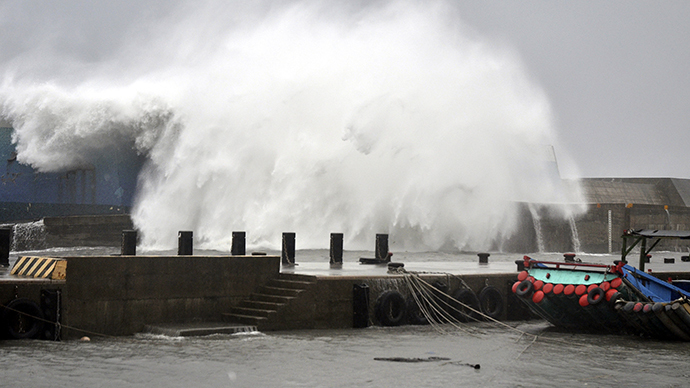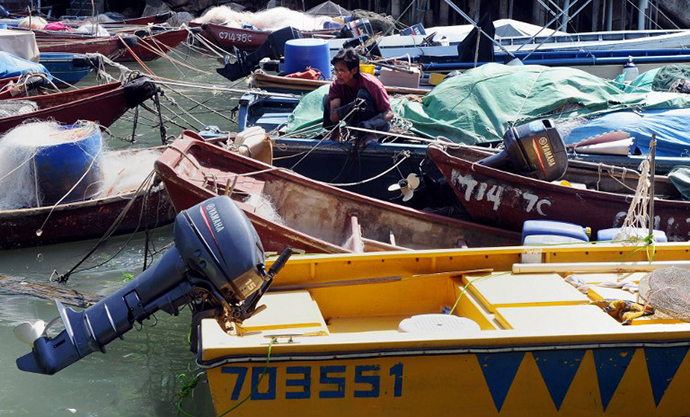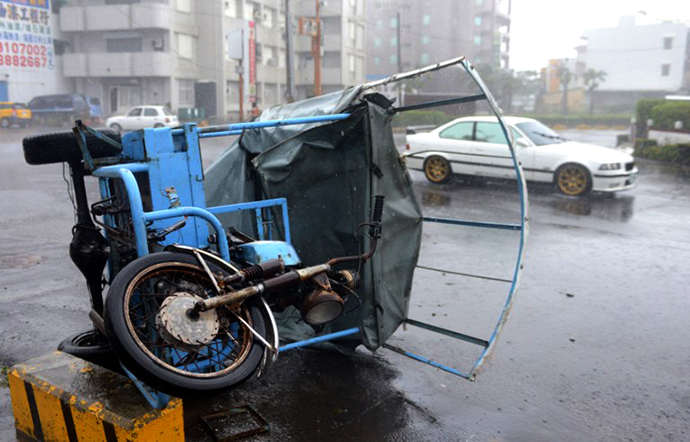Published time: September 23, 2013 02:27
Edited time: September 23, 2013 03:27
Edited time: September 23, 2013 03:27

The harshest storm to reach the Western Pacific this year, Typhoon Usagi hit Hong Kong on Sunday, canceling more than 370 flights and shutting down one of the world's busiest sea ports.
A No. 8 signal warning, the third highest on a five-point scale, remained on Monday morning, forcing financial markets to stay closed for the first part of the day. Authorities said they might lower the warning signal before 10:00 am local time (01:00 GMT).
A total of 25 people were killed, national television broadcaster CCTV reported. Thirteen of them were from Shanwei, located on the eastern fringes of Guangdong province. The victims died from drowning or being hit by debris.
More than 80,000 people have been evacuated to safety in the Fujian province and 50,000 disaster-relief staff are being sent to help, according to Xinhua news agency.

Read More Here
**************************************************************
Typhoon Usagi smashes into southern China
Published time: September 21, 2013 12:16
Edited time: September 23, 2013 03:40
Edited time: September 23, 2013 03:40

A big wave smashes into a breakwater as Typhoon Usagi approaches the eastern coastal town of Taitung September 21, 2013. (Reuters)
The typhoon was earlier on a crash course with Hong Kong, but veered away at the last minute, making landfall near the city of Shanwei in the Chinese province of Guangdong.
Two people in Guangdong province died after they were hit by a fallen tree, Xinhua news agency reported, citing local officials.
Authorities in Guangdong initiated an emergency response plan for the Daya Bay nuclear power station - located northeast of Hong Kong - as Usagi approached, ordering four of six reactors to operate at a reduced load, the agency said.
Police in Shanwei ordered more than 8,000 fishing boats to return to port and more than 1,200 residents were shuttled to temporary shelters.
Usagi – Japanese for 'rabbit' – was classified as a severe typhoon, packing sustained winds of 175 kilometers (109 miles) per hour, with gusts of up to 213 kph (132 mph). The typhoon shut down one of the world's busiest sea ports and severely disrupted flight schedules from the US and Europe.
Hong Kong International Airport said that 370 arriving and departing flights were canceled and another 64 delayed, AP reported. Ferry services between Hong Kong and nearby Macau and outlying islands were suspended as the observatory raised the No. 8 storm warning signal - the third highest on a five-point scale.
The storm, characterized by meteorologists as the most powerful anywhere on Earth this year, earlier killed two people in the Philippines and sparked landslides in Taiwan while en route to southern China. Nine people in Taiwan were reportedly injured by falling trees.
Usagi was downgraded from a super typhoon on Saturday as its sustained winds fell below 241 kilometers (150 miles) per hour as it passed through the the Luzon Strait, which separates the Philippines and Taiwan.
In response to the imminent threat, Hong Kong authorities warned citizens to brace themselves for flooding and powerful winds. Cathay Pacific airline has announced it will suspend services when the storm strikes.

On mainland China, authorities issued a red alert – the highest level warning – and forecast hurricane force winds and heavy rains. Over 4,000 people inhabiting the coastal towns of Fujian Province were evacuated in preparation for Usagi's arrival. Around 23,000 fishing boats have been put into shelter.

The typhoon hit the Batanes islands in the early hours of Saturday morning, knocking down trees and cutting electricity.
Read More Here
**************************************************************
Related articles









No comments:
Post a Comment
Hello and thank you for visiting my blog. Please share your thoughts and leave a comment :)